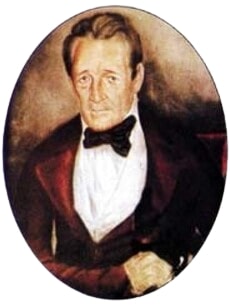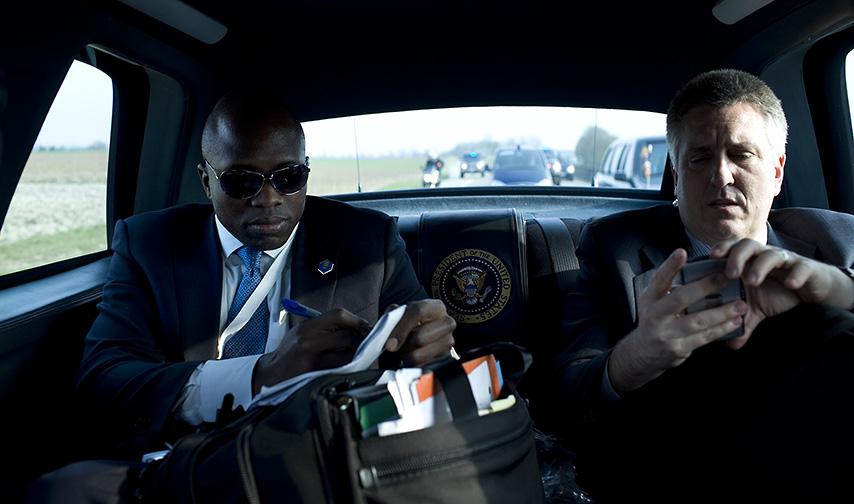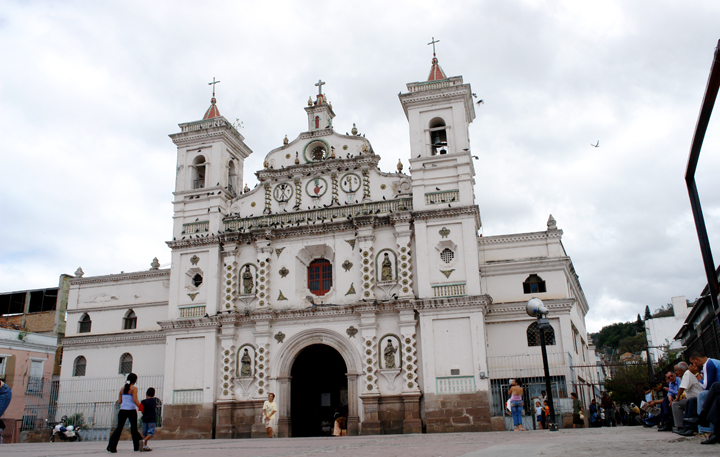|
José Cecilio Del Valle
José Cecilio Díaz del Valle (November 22, 1780 – March 2, 1834) was a philosopher, politician, lawyer, and journalist and one of the most important figures in Central America during the transition from colonial government to independence, displaying a wide-ranging expertise in public administration management.Reyna, Jose (1978).''Hondurenos en la Independencia de Centroamerica ''. Tegucigalpa: EDISOFF Valle was nicknamed 'The Wise'. He was a moderate. Personal life Early years José Cecilio del Valle was born on November 22, 1780, in the village of Choluteca, located near the Choluteca River. This village belonged to the former province of Tegucigalpa (now Honduras), during the Spanish domination. He was the legitimate son of Jose Antonio del Valle and Gertrudis Díaz del Valle. Both members of the most distinguished Spanish families of the Kingdom of Guatemala. who, therefore, have obtained the main political and military jobs. Their wealth consisted mainly of valua ... [...More Info...] [...Related Items...] OR: [Wikipedia] [Google] [Baidu] |
List Of Heads Of State Of Federal Republic Of Central America
This is a list of heads of state of the Federal Republic of Central America from its founding in 1821/1823 until its dissolution in 1840. Heads of state Superior Political Chiefs First Triumvirate Second Triumvirate Presidents ;Political parties See also * Federal Republic of Central America References Citations Bibliography * * * * {{Federal Republic of Central America navbox Heads of state of the Federal Republic of Central America, *List Lists of heads of state, Central America, Federal Republic ... [...More Info...] [...Related Items...] OR: [Wikipedia] [Google] [Baidu] |
Manuel José Arce
Manuel José Arce y Fagoaga (1 January 1787 – 14 December 1847) was a Salvadoran statesman and military officer who served as the first president of the Federal Republic of Central America from 1825 to 1829. Background Manuel José Arce was the son of Spaniard Bernardo José de Arce, the Colonial Intendant of the Intendancy of San Salvador from 1800 until 1801, and Antonia Fagoaga. He was born in the Intendancy of San Salvador, what is now El Salvador. In 1801 he was sent to Guatemala to continue his education. There he graduated in philosophy from the Colegio de San Francisco Borja. He began the study of medicine at the Universidad de San Carlos de Borromeo, but it was interrupted because of his father's sickness. In December 1808, he married Felipa de Aranzamendi y Aguiar in San Salvador. Independence movement Arce joined the movement for independence from Spain, joining in the first Cry for Independence on 5 November 1811 in San Salvador. It was led by his uncle, ... [...More Info...] [...Related Items...] OR: [Wikipedia] [Google] [Baidu] |
People From Choluteca Department
The term "the people" refers to the public or common mass of people of a polity. As such it is a concept of human rights law, international law as well as constitutional law, particularly used for claims of popular sovereignty. In contrast, a people is any plurality of persons considered as a whole. Used in politics and law, the term "a people" refers to the collective or community of an ethnic group or nation. Concepts Legal Chapter One, Article One of the Charter of the United Nations states that "peoples" have the right to self-determination. Though the mere status as peoples and the right to self-determination, as for example in the case of Indigenous peoples (''peoples'', as in all groups of indigenous people, not merely all indigenous persons as in ''indigenous people''), does not automatically provide for independent sovereignty and therefore secession. Indeed, judge Ivor Jennings identified the inherent problems in the right of "peoples" to self-determination, as i ... [...More Info...] [...Related Items...] OR: [Wikipedia] [Google] [Baidu] |
Heads Of State Of The Federal Republic Of Central America
A head is the part of an organism which usually includes the ears, brain, forehead, cheeks, chin, eyes, nose, and mouth, each of which aid in various sensory functions such as sight, hearing, smell, and taste. Some very simple animals may not have a head, but many bilaterally symmetric forms do, regardless of size. Heads develop in animals by an evolutionary trend known as cephalization. In bilaterally symmetrical animals, nervous tissue concentrate at the anterior region, forming structures responsible for information processing. Through biological evolution, sense organs and feeding structures also concentrate into the anterior region; these collectively form the head. Human head The human head is an anatomical unit that consists of the skull, hyoid bone and cervical vertebrae. The skull consists of the brain case which encloses the cranial cavity, and the facial skeleton, which includes the mandible. There are eight bones in the brain case and fourteen in the facia ... [...More Info...] [...Related Items...] OR: [Wikipedia] [Google] [Baidu] |
Secretaries Of Foreign Affairs Of Mexico
A secretary, administrative assistant, executive assistant, Personal assistant, personal secretary, or other similar titles is an individual whose work consists of supporting management, including executives, using a variety of project management, program evaluation, communication, and/or organizational skills within the area of Administration (other), administration. There is a diverse array of work experiences attainable within the administrative support field, ranging between internship, Entry-level job, entry-level, associate, junior, mid-senior, and senior level pay bands with positions in nearly every industry, especially among white-collar worker, white-collar careers. The functions of a personal assistant may be entirely carried out to assist one other employee or may be for the benefit of more than one. In other situations, a secretary is an officer of a society or organization who deals with correspondence, admits new members, and organizes official meeting ... [...More Info...] [...Related Items...] OR: [Wikipedia] [Google] [Baidu] |
Mayors Of Guatemala City
In many countries, a mayor is the highest-ranking official in a municipal government such as that of a city or a town. Worldwide, there is a wide variance in local laws and customs regarding the powers and responsibilities of a mayor as well as the means by which a mayor is elected or otherwise mandated. Depending on the system chosen, a mayor may be the chief executive officer of the municipal government, may simply chair a multi-member governing body with little or no independent power, or may play a solely ceremonial role. A mayor's duties and responsibilities may be to appoint and oversee municipal managers and employees, provide basic governmental services to constituents, and execute the laws and ordinances passed by a municipal governing body (or mandated by a state, territorial or national governing body). Options for selection of a mayor include direct election by the public, or selection by an elected governing council or board. The term ''mayor'' shares a linguistic ... [...More Info...] [...Related Items...] OR: [Wikipedia] [Google] [Baidu] |
Honduran Politicians
Honduran may refer to: * Something of, from, or related to Honduras * Hondurans, persons from Honduras or of Honduran descent * Honduran population, see Ethnicity in Honduras * Honduran Spanish, the language spoken in Honduras * Honduran cuisine * Honduran culture, see Culture of Honduras See also * List of Hondurans This is a list of Honduran people: Politicians * Óscar Acosta * Salvador Aguirre (Honduras) * Juan José Alvarado * José Adolfo Alvarado Lara * Oscar Álvarez * Oswaldo López Arellano * Juan Ángel Arias * Céleo Arias * Juan Ángel Arias Boqu� ... * * {{disambiguation Language and nationality disambiguation pages ... [...More Info...] [...Related Items...] OR: [Wikipedia] [Google] [Baidu] |
1834 Deaths
Events January–March * January 1 – Zollverein (Germany): Customs charges are abolished at borders within its member states. * January 3 – The government of Mexico imprisons Stephen F. Austin in Mexico City. * January – The Wilmington and Raleigh Railroad is chartered in Wilmington, North Carolina. * February 3 – Wake Forest University is founded as the Wake Forest Manual Labor Institute in Wake Forest, North Carolina. * February 12 – Freed American slaves from Maryland form a settlement in Cape Palmas, it is named the Republic of Maryland. * February 13 – Robert Owen organizes the Grand National Consolidated Trades Union in the United Kingdom. * March 6 – York, Upper Canada, is incorporated as Toronto. * March 11 – The United States Survey of the Coast is transferred to the Department of the Navy. * March 14 – John Herschel discovers the open cluster of stars now known as NGC 3603, observing from the Cape of Good Hope. * March 28 – ... [...More Info...] [...Related Items...] OR: [Wikipedia] [Google] [Baidu] |
1780 Births
Events January–March * January 16 – American Revolutionary War – Battle of Cape St. Vincent: British Admiral Sir George Rodney defeats a Spanish fleet. * February 19 – The legislature of New York votes to allow its delegates to cede a portion of its western territory to the Continental Congress for the common benefit of the war. * March 1 – The legislature of Pennsylvania votes, 34 to 21, to approve An Act for the Gradual Abolition of Slavery. * March 11 ** The First League of Armed Neutrality is formed by Russia with Denmark and Sweden to try to prevent the British Royal Navy from searching neutral vessels for contraband (February 28 O.S.). ** General Lafayette embarks on at Rochefort, arriving in Boston on April 28, carrying the news that he has secured French men and ships to reinforce the American side in the American Revolutionary War. * March 17 – American Revolutionary War: The British San Juan Expedition sails from ... [...More Info...] [...Related Items...] OR: [Wikipedia] [Google] [Baidu] |
United Provinces Of Central America
The Federal Republic of Central America (), initially known as the United Provinces of Central America (), was a sovereign state in Central America that existed between 1823 and 1839/1841. The republic was composed of five states (Costa Rica, El Salvador, Guatemala, Honduras, and Nicaragua), and a Federal District from 1835 to 1839. Guatemala City was its capital city until 1834, when the seat of government was relocated to San Salvador. The Federal Republic of Central America was bordered on the north by Mexico, on the south by Gran Colombia and on its eastern coastline by the Mosquito Coast and British Honduras, both claimed by the federal republic. After Central America (then the Captaincy General of Guatemala) Act of Independence of Central America, declared its independence from the Spanish Empire in September 1821, it was Central America under Mexican rule, annexed by the First Mexican Empire in January 1822 before regaining its independence and forming a federal republ ... [...More Info...] [...Related Items...] OR: [Wikipedia] [Google] [Baidu] |
History Of Central America
Central America is commonly said to include Guatemala, Belize, El Salvador, Honduras, Nicaragua, Costa Rica, and Panama. This definition matches modern political borders. Central America begins geographically in Mexico, at the Isthmus of Tehuantepec, Mexico's narrowest point, and the former country of Yucatán (1841–1848) was part of Central America. At the other end, before its independence in 1903 Panama was part of South America, as it was a Department of Colombia. At times Belize, a British colony until 1981, where English instead of Spanish is spoken, and where the population is primarily of African origin, has been considered not part of (Spanish-speaking) Central America.Long and narrow, Central America does not have an obvious geographical center. Until the middle of the 20th century there were no roads between the countries, which isolated them from each other, and railroads have never connected them. During colonial times Guatemala was the administrative and religiou ... [...More Info...] [...Related Items...] OR: [Wikipedia] [Google] [Baidu] |
Tegucigalpa
Tegucigalpa ( )—formally Tegucigalpa, Municipality of the Central District ( or ''Tegucigalpa, M.D.C.''), and colloquially referred to as ''Tegus'' or ''Teguz''—is the capital and largest city of Honduras along with its sister city, Comayagüela. Claimed on 29 September 1578 by the Spanish colonization of the Americas, Spaniards, Tegucigalpa became the Honduran capital on 30 October 1880, under President Marco Aurelio Soto, when he moved the seat of government from Comayagua, which had been the Honduran capital since its independence in 1841. The 1936 constitution established Tegucigalpa and Comayagua as a Central District, and the current 1982 Honduran Constitution continues to define the sister cities as a #Central District, Central District that serves as the permanent national capital. Tegucigalpa is located in the southern-central highland region known as the Departments of Honduras, department of Francisco Morazán Department, Francisco Morazán of which it is also t ... [...More Info...] [...Related Items...] OR: [Wikipedia] [Google] [Baidu] |






